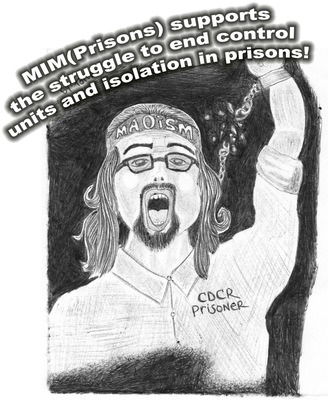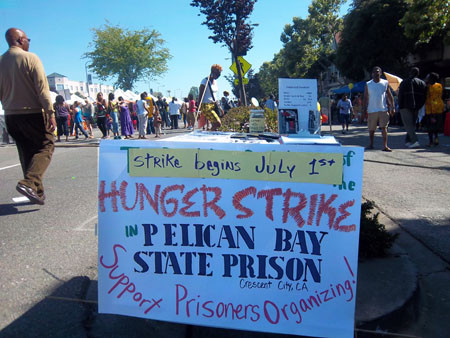In a May 23, 2011 decision by the United States Supreme Court in
Brown v. Plata (2011) 563 U.S., the court held that a
population limit of 146,000 prisoners was necessary to remedy
unconstitutional medical and mental health conditions in California
prisons. Although the Court recognized that there were other factors
which contributed to inadequate medical and mental health care, the
court nevertheless found that the primary cause of those deficiencies
was overcrowding. There are just not enough qualified medical and mental
health staff to effectively treat 175,000 prisoners in a system designed
to house only 80,000 prisoners. These overcrowded conditions are leading
to the spread of many diseases and delaying other medical conditions
that are going untreated and resulting in unnecessary pain and death.
Overcrowding is also affecting staff’s ability to properly treat
prisoner’s mental health conditions. California prisons have a prison
suicide rate 80% higher than the national average. 72% of suicides in
California prisons involved some measure of inadequate assessment,
treatment, or intervention, and were therefore most probably foreseeable
and/or preventable had mental health staff not been overburdened with so
many prisoners.
Because there was a concern with the consequences of releasing 46,000
prisoners into the community, the court ordered California to
immediately start identifying those prisoners who pose the least risk of
reoffending and offer them an expansion of good-time credits towards
early release. Based on these concerns, it is most likely that those
convicted of violence will not be afforded early release. The Court was
concerned with the consequences of a previous Court ordered population
cap on Pennsylvania prisons in which, during an 18-month period after
their release, police rearrested 9,732 prisoners for committing new
crimes. Those new crimes included 79 murders, 90 rapes, 1,113 assaults,
959 robberies, 701 burglaries, 2,748 thefts and thousands of drug
related offenses. Based on that prior experience, which the Court did
not want to repeat, the Court recommended that besides releasing those
most likely not to reoffend, California could find other alternatives
like diverting low-risk offenders to community based programs such as
drug treatment, day reporting centers, and electronic monitoring,
instead of releasing violent prisoners.
The California legislature was already working on such a proposal in
Assembly Bill 109 which was recently passed and signed by the Governor.
AB-109 includes 640 amendments to various California statutes, not all
concerning prisoners. As for those that do address overcrowding, only
two are worth noting.
The first is an amendment to California Penal Code (PC) 1170(h) which
now allows certain persons sentenced up to 3 years to serve that entire
sentence in a county jail. Before, only a sentence of 1 year or less was
required to be served in the county jail. Those who will not be required
to serve a sentence of 3 years or less in a county jail are: anyone who
has a prior or current felony conviction for a serious felony as
described in PC 1192.7(c ), a violent felony as described in PC 667.5(c
), anyone required to register as a sex offender, and anyone who
received a sentence enhancement pursuant to PC 186.11.
The second change worth noting is the promulgation of “The Postrelease
Community Supervision Act of 2011.” This Act added sections 3000.09; and
3450 through 3458 to the California Penal Code. The Act states that all
those released on and after July 1, 2011 who have not been convicted of
a serious felony pursuant to PC 1192.7(c ); a violent felony as
described in PC 667.5(c ); sentenced pursuant to PC 667(c )(2); PC
1170.12(c )(2); or any person classified as a High Risk Sex Offender,
will no longer be on parole nor under the jurisdiction of the California
Department of Corrections and Rehabilitation (CDCR). Instead, those
persons not convicted of violent or serious felonies as described above
will now be released on what will be known as “Postrelease Supervision”
and will fall under the jurisdiction of the Sheriff or Director of the
County Correctional department for the County that person is released
to.
Those persons who qualify for postrelease supervision will be on this
new form of supervision for no longer than three years at which time
they will be discharged from all supervision. Those on Postrelease
Supervision will not be returned to prison for violations of their
postrelease supervision conditions. Instead, they will be subject to a
variety of other alternatives which will be known as “Community Based
Punishment.” Such punishment could include what will be called
“Short-Term Flash Incarceration” which means that a technical violation
could subject the offender to County Jail time of no more than seven
days. Other forms of community-based punishment include: intensive
community supervision; additional monetary restitution; work, training,
or education in a furlough program; placement in a substance abuse
treatment program, community service; random drug testing; or home
detention with Global Positioning Satellite (GPS) monitoring.
Those who are released on and after July 1, 2011 and do not qualify for
Postrelease supervision because they were convicted of violent or
serious felonies as described above will remain under the jurisdiction
of the CDCR and will not see any significant change in their parole
conditions and parole revocation procedures.
Those who were already paroled prior to July 1, 2011 will remain under
the jurisdiction of the CDCR because they were paroled before the new
law took effect. Except that those who were not convicted of violent or
serious felonies will have a chance to have their parole reviewed so
long as they complete six months of continuous parole without any
violations. If the person has not violated parole within six months, he
or she will be recommended for Postrelease Supervision and subject to
Postrelease Supervision as described in PC3450 through 3458. Those
persons also paroled prior to July 1, 2001 but were convicted of serious
and violent felonies as described above will remain on parole under the
jurisdiction of the CDCR because they would not have qualified for
Postrelease Supervision even if they had been paroled after the new law
took effect.
California has until May 23, 2013 to comply with the release of 46,000
prisoners unless it requests a five year extension. The extension may be
granted only if California satisfies necessary and appropriate
preconditions designed to ensure that measures are taken to implement
the release without delay. Because California has already relieved its
prisons of 9,000 prisoners through out-of-state-transfers, it now has
37,000 more prisoners to address. After the United States Supreme Court
had finished hearing oral arguments and was getting ready to issue its
decision, California informed the Court that it was working on AB-109.
California did not give the Court a specific number of prisoners that
would be affected by AB-109. California only said that “thousands” would
qualify under AB-109 to serve 3-years or less in a county jail and be
released on Postrelease Supervision. California will eventually have to
give a specific number of persons who will not end up in prison as a
result of AB-109. Once California gives a specific number of persons
affected by AB-109, it will then have to introduce more legislation in
order to release more prisoners or prevent them from coming to prison.
As of right now, no prisoner has been released, they have just been
transferred to another state or prevented from ending up in prison.
This is just a brief outline of what has recently taken place to address
overcrowding in California. It is up to those of you who might be
affected to do your own research into the information provided above.
Because of space limitations, not every detail of the Court’s order or
Assembly Bill 109 could be described in detail. So if you did not
qualify under AB-109, you might qualify for release under another change
in the law in the near future. If you will not qualify for early release
in the future, you should at least see some improvement in medical and
mental health care which was the whole purpose of the population cap in
the first place. So everyone should be affected one way or another. Good
luck with your struggles.
MIM(Prisons) comments: This is a good overview of the new court
ruling about health care and overcrowding in California prisons. While
we hope that the net effect of this ruling is the release of some
prisoners and prevention of locking up others, we’re not optimistic that
this will lead to any substantive changes. We have seen court rulings in
the past about prison conditions, and as the pages of Under Lock and
Key have documented, the Criminal Injustice System is very creative
about worming their way out of restrictions to find new ways to oppress.
The size of the California prison population represents job security and
high wages for staff, and they will not give this up without a fight. It
is a condemnation of the imperialist system that it enables people to
profit off the torture and destruction of humyns. Only by ending
imperialism overall will we be able to truly change the criminal
injustice system. Until that time, we hope our comrades behind bars will
find creative ways to use this court ruling to their advantage.






 Alabama
Alabama
 Alaska
Alaska
 Arizona
Arizona
 Arkansas
Arkansas
 Army Post
Army Post
 California
California
 Colorado
Colorado
 Connecticut
Connecticut
 Delaware
Delaware
 District of Columbia
District of Columbia
 Federal
Federal
 Florida
Florida
 Georgia
Georgia
 Guam
Guam
 Hawaii
Hawaii
 Idaho
Idaho
 Illinois
Illinois
 Indiana
Indiana
 Iowa
Iowa
 Kansas
Kansas
 Kentucky
Kentucky
 Louisiana
Louisiana
 Maine
Maine
 Maryland
Maryland
 Massachusetts
Massachusetts
 Michigan
Michigan
 Minnesota
Minnesota
 Mississippi
Mississippi
 Missouri
Missouri
 Montana
Montana
 Nebraska
Nebraska
 Nevada
Nevada
 New Hampshire
New Hampshire
 New Jersey
New Jersey
 New Mexico
New Mexico
 New York
New York
 North Carolina
North Carolina
 North Dakota
North Dakota
 Ohio
Ohio
 Oklahoma
Oklahoma
 Oregon
Oregon
 Pennsylvania
Pennsylvania
 Puerto Rico
Puerto Rico
 Rhode Island
Rhode Island
 South Carolina
South Carolina
 South Dakota
South Dakota
 Tennessee
Tennessee
 Texas
Texas
 Utah
Utah
 Vermont
Vermont
 Virginia
Virginia
 Washington
Washington
 West Virginia
West Virginia
 Wisconsin
Wisconsin
 Wyoming
Wyoming


